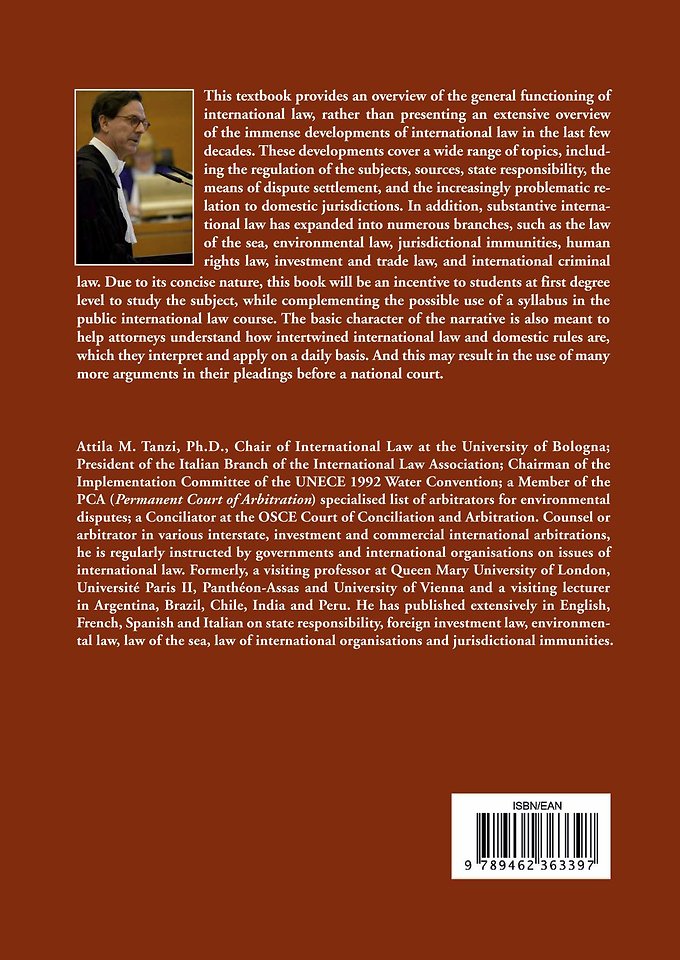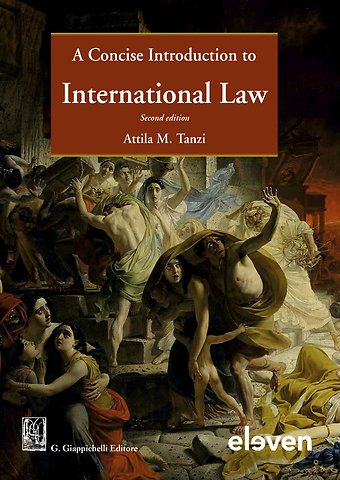



Attila M. Tanzi, Ph.D., Chair of International Law at the University of Bologna; formerly, visiting professor at Queen Mary University of London, Universitè Paris II, Panthèon Assas and University of Vienna.
Meer over Attila TanziA Concise Introduction to International Law
Samenvatting
This textbook provides an overview of the general functioning of international law, rather than presenting an extensive overview of the immense developments of international law in the last few decades. These developments cover a wide range of topics, including the regulation of the subjects, sources, state responsibility, the means of dispute settlement, and the increasingly problematic relation to domestic jurisdictions. In addition, substantive international law has expanded into numerous branches, such as the law of the sea, environmental law, jurisdictional immunities, human rights law, investment and trade law, and international criminal law.
Due to its concise nature, this book will be an incentive to students at first degree level to study the subject, while complementing the possible use of a syllabus in the public international law course. The basic character of the narrative is also meant to help attorneys understand how intertwined international law and domestic rules are, which they interpret and apply on a daily basis. And this may result in the use of many more arguments in their pleadings before a national court.
Trefwoorden
Specificaties
Inhoudsopgave
Preface to the first edition XV
List of abbreviations XVII
Chapter 1
What is international law
1. Who needs a basic knowledge of international law and why 3
2. Regulating the relations between states and constraining their external sovereignty… 5
3. …And internal sovereignty 7
4. Why do states undertake international obligations? 9
4.1. The example of the Rio Grande Agreement 10
5. Why do states comply with and breach international law? 12
6. Can we speak of a Constitution of the international society of states? A brief history 18
7. Differences and similarities between international law and domestic jurisdictions 26
7.1. Predictability 28
8. Concluding remarks 31
Further reading 35
Chapter 2
Who makes international law and its recipients
1. The subjects and actors of international law. Introductory remarks 39
2. States and statehood 41
2.1. Recognition 44
2.1.1. Two difficult cases, among others: Kosovo and Crimea 48
3. Intergovernmental organisations 52
4. Non-state entities 55
4.1. Individuals 55
4.2. NGOs 60
4.3. Corporations 63
Further reading 65
Chapter 3
Making and changing international rules
1. Sources of law and sources of international law 69
1.1. The absence of legislation in international law 73
2. Article 38 of the Statute of the International Court of Justice 79
3. International agreements. Introductory qualifications 80
3.1. Treaty law 88
3.1.1. Negotiations, adoption, manifestation of consent and entry into force 88
3.1.2. Invalidity, termination and suspension of treaties 93
3.1.3. Reservations and treaty interpretation 103
4. International custom 106
4.1. The role of precedents 108
5. General principles of law 110
6. Relationship between the sources of international law 116
6.1. Relationship of compatibility 117
6.2. Relationship of conflict 119
7. So-called ‘soft-law instruments’ 122
Further reading 125
Chapter 4
International law and domestic jurisdictions
1. Background 129
2. The monism v dualism controversy and balancing 130
3. Municipal law in international law and before international courts and tribunals 133
3.1. Jurisdictional immunities case between Germany and Italy 135
4. International law in municipal law and before domestic courts and tribunals 138
5. The doctrine of incorporation of customs and transformation of treaties in common law jurisdictions 140
6. The ‘receipt’ of international law in civil law jurisdictions 146
7. The crux of the matter: conflict and precedence 150
8. Jurisprudential nationalism 152
Further reading 159
Chapter 5
Breaching international law and its consequences
1. Introduction 163
2. International wrongs and state responsibility 165
2.1. Internationally wrongful act of states 168
2.1.1. Violation of an international obligation and attribution thereof 168
2.1.2. Circumstances precluding wrongfulness 175
2.2. The legal relationship of responsibility 180
2.2.1. Violation of erga omnes obligations 183
3. State liability and civil liability 186
Further reading 190
Chapter 6
The international means of dispute settlement
1. Introduction 195
2. The existence of a legal dispute 197
3. Diplomatic means of dispute settlement 202
4. Adjudicative means 208
5. Institutional means for the settlement of disputes over collective interests and emerging cases of resort to adjudication 218
5.1. The UN 221
5.2. Compliance review mechanisms 224
Further reading 226
Chapter 7
Select areas of substantive international law
1. Introduction 229
2. International economic law 231
2.1. International law on protection and promotion of foreign investment 231
2.2. WTO law 239
3. The law of the sea 242
4. International human rights law 247
5. International environmental law 254
6. International criminal law and justice 260
7. The law of jurisdictional immunities 264
8. International law on migration 269
Further reading 274
Conclusions: Multilateralism v Unilateralism 277
Anderen die dit boek kochten, kochten ook
Rubrieken
- cadeauboeken
- computer en informatica
- economie
- filosofie
- flora en fauna
- geneeskunde
- geschiedenis
- gezondheid
- jeugd
- juridisch
- koken en eten
- kunst en cultuur
- literatuur en romans
- mens en maatschappij
- naslagwerken
- non-fictie informatief/professioneel
- paramedisch
- psychologie
- reizen
- religie
- schoolboeken
- spiritualiteit
- sport, hobby, lifestyle
- thrillers en spanning
- wetenschap en techniek
- woordenboeken en taal





